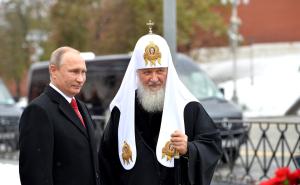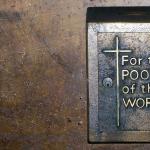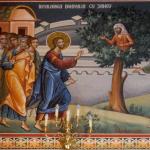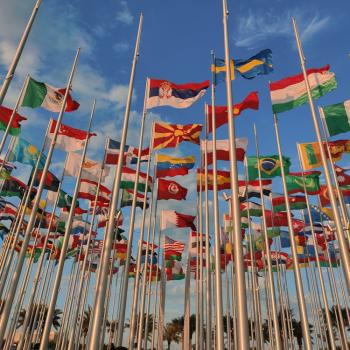
Russophobia has been, and can be, a real issue, but we must not confuse criticism of Russian authorities as itself being indicative of Russophobia. No one is above criticism, though the criticism must be just and sound, not based upon ideological prejudices and biases (as Russophobia tends to be. Just as we can understand the Black Legend exaggerated facts and caused undue biases against Spain, so Russophobia has caused many to hold Russia, its people, and the faith and beliefs of the people, to disdain; this was especially true during the Cold War, when the United States and Russia held their greatest sway, each fighting against the other’s ideologies. Russophobia influenced the way many in the West read Russian history and religion; Russian Orthodoxy was so different from popular Evangelical Christianity in the United States, it was mocked and ridiculed, often portrayed as a barbaric, irrational faith, one which allied itself too quickly to the state. Because of historical Russophobia, it is easy to see how and why those who are critical of Putin and his relationship with the Russian Orthodox Church might want to suggest this is a continuation of age-old Russophobia, but in reality, this is a diversion, an attempt to ignore just criticism, both of the way Putin had led and continues to lead Russia as well as in the way various members of the Orthodox hierarchy, including the Patriarch, seem to align themselves with Putin’s worldly objectives. In reality, much of the criticism which is given to Putin’s regime, as well as criticism given concerning the actions and attitudes of Kirill, follow internal Russian and Orthodox criticism of both, and as such, it is far from being an example of Russophobia.
We should not be surprised that Putin, and various Russian Orthodox leaders, promote the notion that Russophobia lies behind the way the world is reacting to them, especially in relation to their stand with the Ukraine. We should expect it, because it has already been one of the ways Putin has addressed the situation. Putin claims that Russians in the Ukraine are being threatened with genocide thanks to such Russophobia, as the BBC News reported of a speech Putin gave in December of 2021:
The Russian president’s remarks on Thursday were aimed at addressing the issue of discrimination against Russian speakers beyond Russia’s borders, many of whom live in the Donbas region of eastern Ukraine.
He said that Russophobia was the first step towards genocide.[1]
Putin is using Russophobia as an excuse to justify his actions, actions which are putting us to the brink of armed conflict, if not outright war, in the Ukraine. He is making it as an issue of defending the Russian people, though in reality, he is the one who is engaging violence and would be the one invading a foreign territory.[2] What must be made clear is that Putin does not speak for all Russians, and so his claim that this is an issue of Russia versus external, prejudiced hatemongers is false, as Janusz Bugajski said in the Washington Examiner:
This misleading epithet is intended to rally ordinary Russians around the Kremlin as the purported victims of international conspiracies. In countering such disinformation, Western policymakers must expose Moscow’s international terrorism and make clear distinctions between Vladimir Putin’s regime and the Russian people. The evidence for the Kremlin’s game is clear.[3]
The current Patriarch of Moscow, Kirill, has lent his support to Putin, and seems to be mirroring Putin’s secular policies with the church. This can be seen in the way Moscow has been dealing with the rest of the Orthodox Church, such as its current attempt to establish a Patriarchal Exarchate in Africa, undermining the Alexandrian See. Likewise, Moscow wants to establish such an Exarchate in Turkey, undermining Constantinople (continuing its practical schism with the Patriarch of Constantinople). Moscow does this in union with Putin and Putin’s attempt to expand his power in the world, so much so, that the two can be seen as working hand in hand, which is why Putin consistently honors Kirill and Kirill continues to honor and promote Putin. Their mutual support for each other was especially highlighted in the speech Kirill gave when Putin honored him with the Order of St. Andrew for Kirill’s 75th birthday; in it, Kirill lauded Putin and the place Putin wants Russia to have in the world. Their combined vision especially connects to the situation in the Ukraine, because Kirill rejects Ukrainian Orthodox and their declaration of being autocephalous, similar to the way Putin does not properly respect Ukrainian independence.
It is easy to see how criticism of the relationship between Putin and Kirill can be said to be the result of Russophobia. And yet, it must be made clear, it is a criticism which is not made merely by those who live outside of Russia, but those within Russia, including and especially those who are active members of the Russian Orthodox faith. Back in 2019, various Russian Orthodox priests gave their support to those who protested Putin and his harsh treatment of them:
In September, Russian Orthodox priests signed an open letter condemning what they called the “repressive” trials of more than two dozen protesters — the majority of them in their twenties or thirties — who have been charged for participating in the protests. To date, six of the protesters remain behind bars awaiting trial, while eight more have been handed prison terms of up to five years.[4]
They were accused by officials in Moscow of engaging politics and silenced:
The priests’ letter provoked an immediate rebuke, with the Church’s spokesman, Vakhtang Kipshidze accusing the clerics of meddling in politics. At least one of the signatories was reportedly barred from carrying out church services.[5]
If it were mere Russophobia, there would be no interest in and engagement with the tradition and thought coming out of Russia. Only because such thought is being repressed, and those engaging it abused by the state, does it seem like Russia has a unified way of thought. However, that is not the case, and the other voices are important, representing elements of the greater Russian tradition. We can and should promote Russia without promoting and supporting repressive regimes; indeed, by criticizing such regimes for the sake of the people and freeing them from the confines of such abuse, the full Russian spirit can be embraced and engaged. With such a goal, we find ourselves far from those who follow Russophobia, because they would dismiss and reject the whole of the Russian tradition. This is also why many who are connected with the Russian theological and spiritual tradition can look upon what is happening in Russia with horror without rejecting the Russian tradition; to call them Russophobes would be ridiculous. [6]
The religious rhetoric which surrounds the Patriarch of Moscow’s relationship with the Ukraine is quite telling; it matches and supports Putin and his desire to control the Ukraine. It is easy to see how and why the Patriarchate is often seen to be a puppet of Putin, though to be sure, the Patriarchate has his reason for his engagement with Putin, for Putin’s desire for power in the world will help him with his desire for ecclesial power in the Orthodox world. We must not stand silent, nor allow claims of Russophobia, which will come, undermine our response to the crisis in the Ukraine. The people of the Ukraine, secular and religious alike, should be respected and not forced into Putin’s tyrannical regime. Putin, as the Catholic Bishops of Poland and the Ukraine indicates, does not follow international law (and so is trying to become a law unto himself, typical of tyrants and dictators):
We have received with concern the news that the recent series of talks between Russia and the West have not led to an agreement. In their speeches, the leaders of many countries point to Russia’s increasing pressure on Ukraine, as massive armaments and troops are gathered on its border. The occupation of Donbas and Crimea has shown that the Russian Federation—in its violation of Ukraine’s national sovereignty and territorial integrity—disregards the binding rules of international law. The current situation represents a great danger for the countries of Central and Eastern Europe and the entire European continent, which may destroy the progress made so far by many generations in building a peaceful order and unity in Europe.[7]
A great danger that lies before us today; we must certainly pray for peace, and that build up for war does not end with war. But we must also realize where the problem lies: with Putin, and with those within the Russian Orthodox Church promoting and supporting Putin. The Ukraine deserves to have its rights respected, even as the Ukrainian Orthodox should have their rights and privileges defended. It is not Russophobia to look with concern the way Putin and Kirill deal with the world. They do not represent the whole of Russia in themselves, even as President Trump did not represent the whole of the United States in himself. While Russophobia can be real, and has caused great strife due to the prejudices it has established, we should not allow the term to be abused and used to promote tyranny. While it is not Russophobia which leads us to see the problems within Putin’s regime, nor to see the problems inherent within Kirill’s support of Putin, we must make sure it doesn’t become such, it is important to highlight the voices of those who stand against the current regime, from within Russia itself, so as to make sure we truly listen to, engage, support, and learn from good which comes from the Russian tradition and not reject it en masse as Russophobia would lead us to do.
[1] BBC News, “Russia Ukraine: Putin Compares Donbas War Zone To Genocide” (12-10-2021).
[2] Hitler made similar justifications for his occupation of the Sudetenland, and for his invasion of Poland.
[3] Janusz Bugajski, “Reject Putin’s ‘Russophobia’ Defense For Terrorism” in The Washington Examiner (4-28-2021).
[4] Marc Bennetts, “Why Orthodox Christians Are Losing Faith in Putin” in Politico (12-24-2019).
[5] Marc Bennetts, “Why Orthodox Christians Are Losing Faith in Putin.”
[6] Thus, Russian Sophiology, which has engaged and embraced many positive elements from the Slavophile movement, is one of the key modern theological traditions which influence my own theological narrative.
[7] Catholic Bishops of Poland and Ukraine, “Appeal to Seek Dialogue and Understanding in Order to Advert the Danger of Hostilities” (1-24-2022).
Stay in touch! Like A Little Bit of Nothing on Facebook.
If you liked what you read, please consider sharing it with your friends and family!













